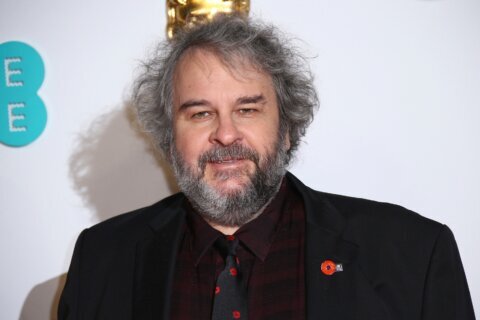WASHINGTON — It predicted a Best Picture winner by screening “Spotlight” its inaugural year.
Now, the third annual Double Exposure: Investigative Film Festival returns from Oct. 19-22.
Most screenings take place at the Naval Heritage Center in Penn Quarter, except for opening night at the National Portrait Gallery, screening “One of Us” by Heidi Ewing and Rachel Grady.
“That film is taking an inside look at a Hasidic community in Brooklyn, New York, and three people who decide to leave the community,” co-founder Diana Schemo said. “What they face, in terms of preparation, for life outside and the experience of trying to leave the community.”
As for the rest of the films, this year’s slate sifted out into several common categories.
“As we put them together, we saw certain themes emerging,” Schemo said.
Journalism Interrogating Itself
“One of those themes is journalism interrogating itself,” Schemo said. “This is, of course, in the context of this unprecedented hostility toward the press from 1600 Pennsylvania Ave. and other quarters that is conflating fake news, real news and questioning whether a verifiable truth exists or whether there’s just your truth, my truth, today’s truth, yesterday’s truth.”
One of such film is the documentary “Voyeur” by Myles Kane and Josh Koury.
“Gay Talese reported on [a] peeping tom who bought a motel in Colorado and outfitted it to allow himself to observe people in their intimate moments,” Schemo said. “Shortly after the story came out, Paul Farhi of The Washington Post did a story raising questions about certain dates and factual errors. Gay Talese was immediately very upset [and] felt terrible about it, but then he revisited it and talked to his source and he said, ‘I still believe what I reported.'”
Another film in this same theme is “The End of Truth” by Eric Matthies and Tricia Todd, exploring journalists James Foley and John Cantlie, who were both kidnapped by ISIS in 2012.
“For James Foley it was tragic; he was obviously beheaded and that ushered in a whole era of almost random kidnappings of foreign journalists,” Schemo said. “John Cantlie was another kind of tragedy. He went on to become ISIS’ correspondent and do these reports that appear on YouTube that were carrying water for ISIS. I think it was probably his way of staying alive.”
Hidden History
A second theme at this year’s festival is the “Hidden History” of race relations. One such film is “The Rape of Recy Taylor” by Nancy Buirski about a relatively unknown rape case in 1944.
“It’s about a gang of young white men in Alabama who raped a 24-year-old mother, Recy Taylor,” Schemo said. “Uncharacteristically, she spoke up about it very publicly. Rosa Parks took on her case and it became a very big issue, but mostly among black people. … For the white mainstream press, it didn’t really get the coverage it deserved. This film parts the curtain on a whole history of white-on-black violence that has essentially been erased.”
Another is “Did You Wonder Who Fired the Gun?” by Travis Wilkerson about a 1946 murder.
“Travis Wilkerson, who’s a white guy, is looking into his great-grandfather’s killing of a black man,” Schemo said. “Oddly enough, it happened in the next town over from where ‘The Rape of Recy Taylor’ is located in Alabama. That film actually takes you into Abbeville, which is where the first film happened, so there are these two films that are about this very small patch of territory in the United States, but that are really illuminating something bigger.”
Immigration and Latin America
A third recurring theme is immigration, including “Cocaine Prison” by Violeta Ayala.
“It’s a fantastic film, really well done,” Schemo said. “It’s taking you inside a really overcrowded prison in Bolivia, following one kid who’s growing up this Coca Economy in rural Bolivia and decides to cross into Argentina with cocaine as a mule for this drug dealer. He gets busted on his first trip and gets sent up for four years. … It becomes a very interesting window into that world of this overcrowded prison and this cocaine that is at the heart of the problem.”
Another film in this vein is “Devil’s Freedom” by Everardo Gonzalez.
“A very dark film that is deeply disturbing but [is] unforgettable actually,” Schemo said. “This film [has] interviews with victims of violence in Mexico. It’s almost incomprehensible the level of violence we see. The filmmaker puts masks on the people he’s interviewing so that they’re free to speak … both victims and perpetrators, so you see this very rare candor emerge.”
Such topics are very timely with the current political climate.
“There’s a huge discussion we’re having in this country right now about immigration and the wall, how big should a wall be, the dreamers, should people be sent back? And it seems like none of that discussion is shaped by this reality on the other side of the border. It seems like it’s all about: ‘These are just people who just want to come here and get more money for painting a house than they would there!’ But there’s a much darker [reality]: physical survival.”
Symposium
Beyond the movies themselves, there’s also the annual symposium. This year’s educational programs will be held at both the National Union Building and The Loft at 600 F St. NW.
“We look at how to do investigative reporting on a really rapid turnaround,” Schemo said. “A lot of newsrooms have added staff and are trying to get stories out quicker. But we’ve seen, as with CNN, sometimes that can be perilous. Investigative reporting is a very laborious, painstaking process to get everything right. When you speed the clock, it’s a scary tightrope.”
The festival is also hosting a pro-bono legal clinic for investigative storytellers.
“The whole purpose [is] to seed the next generation of investigative storytelling. It’s an important thing to remember — when journalism, rights of reporters and the enterprise of watchdog reporting is coming under fire — that people who practice it take it very seriously, are willing to risk their lives and criticize themselves when they get it wrong. That’s what comes through in these films. We felt it’s a timely message that needs to be out this year.”
Click here for more details. Listen to our full chat with festival co-founder Diana Schemo below:








